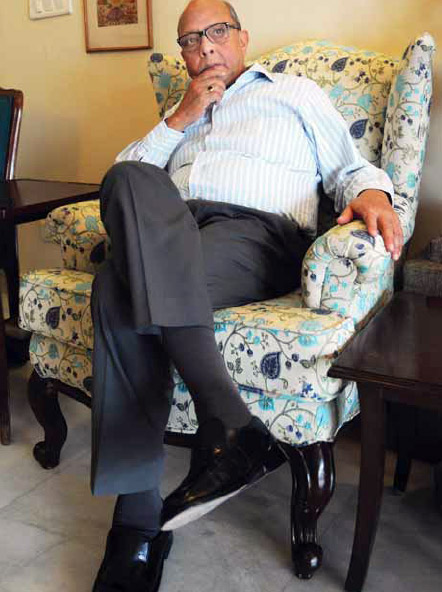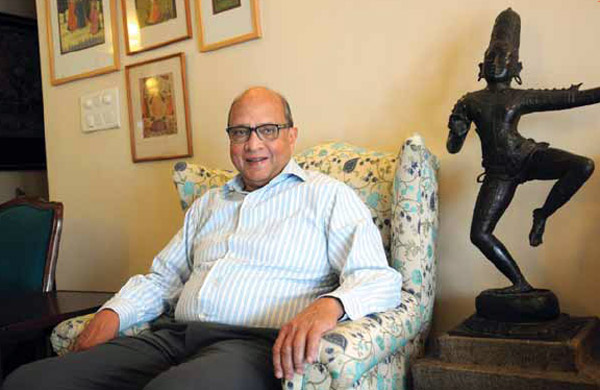- Cover Story
- Governance
- Globe Scan
- Corruption
- State Scan
- Talk Time
- Cover Story
- Governance
- Globe Scan
- Corruption
- State Scan
- Talk Time
Recent Posts
© Copyright 2007 - 2023 Gfiles India. All rights reserved powered by Creative Web INC.First StirringsTurnaround Man
The man behind the world famous Khajuraho dance festival, PC Sen was also responsible in increasing MP Tourism’s budget and bringing Air India staff’s emoluments at par with the private sector
Narendra KaushikJuly 9, 20175 Mins read3.3k Views
 Written by Narendra Kaushik
Written by Narendra KaushikFOR Probir Chandra Sen, his indecision is what landed him into the civil services. Grandson of AN Sen, former judge of the Calcutta High Court, and son of Pratap Chandra Sen, a top executive in Burmah Shell, Probir, better known as PC Sen, had an admiration for the Communist Party of India and the Ramakrishna Mission, but was not fully convinced by either.
“I thought of becoming a Marxist or joining Ramakrishna Mission when I was at Cambridge (He did his post-graduation from King’s College in History), but neither convinced me fully. I chose IAS as a compromise,” he says.
Besides, civil services promised him a steady income, something his family was in need of as his father had passed away at a very young age leaving no money. He was offered a job in Shell. Instead, he worked in Clarion for two years.
Sen’s uncle, Mohit Sen, was a card-holding member of the Communist Party of India and a theoretician. His great grandfather from the maternal side, RC Dutt, was one of the first Indians in Indian Civil Services (ICS).
Sen cleared the civil services examination in 1967. He joined Lal Bahadur Shastri National Academy of Administration (LBSNAA) as an IAS probationer on July 31, 1967, one month after his other colleagues in the batch joined. The delay was caused because the government wanted to be sure he had no communist leanings. In fact, his family met the Governor of Gujarat, Sharda Mukherjee, and the then Minister of State (MoS) for Home at the Centre, VC Shukla, to intercede.
Sen met his wife Binoo, also an IAS of the same cadre and batch, in the Academy but the two tied the knot a couple of years after serving their probation.
His first posting was in Gwalior as an Assistant Collector. His Collector, NN Tandon, was an exceptionally talented and inspiring person and invited him to stay with him for the year under training.
 Sen worked under patwaris, tehsildars, police and revenue officers to learn the intricacies of administration and camped in a village called Panihar for a month to understand people’s problems. He commuted around in Dabra, his sub-division (after his promotion as Sub Divisional Officer in 1969), on a cycle.
Sen worked under patwaris, tehsildars, police and revenue officers to learn the intricacies of administration and camped in a village called Panihar for a month to understand people’s problems. He commuted around in Dabra, his sub-division (after his promotion as Sub Divisional Officer in 1969), on a cycle.From 1971 to 1974, he served as Deputy Transport Commissioner and Additional Collector, Gwalior. He remembers the period as the happiest days of his service.
Sen found his next posting as Deputy Secretary in General Administration Department ‘boring’. A year later, he volunteered to be appointed Director of Archaeology and Museums in the State.
He recalls the three-year long stint as extremely productive and satisfying. “I got an opportunity of visiting wonderful monuments,” he recollects. In those days, sculptures were lying around across the State. He got five truckloads of priceless sculptures collected from Hinglajgarh and stored in Indore museum.
In 1980, Sen was appointed Managing Director, Madhya Pradesh State Tourism Development Corporation (MPSTDC). The budget of the corporation, in those days, was Rs. 1 crore, Rs. 16 crore less than the budget of its counterpart in Haryana.
He started the now famous Khajuraho dance festival after great efforts. He says the Archaeological Survey of India (ASI) was not giving permission of the festival and he had to meet the then Prime Minister Indira Gandhi for the permission. The advertising campaign of MP Tourism was hailed all around. Celebrated photographer Raghu Rai was hired for the photographs. Chandra served in the post for three years.
FROM 1984 to 1985, he was made Commissioner, Gwalior. He got on very well with Madhavrao Scindia, the then Lok Sabha representative from the city.
In 1985, he moved to the Centre as Joint Secretary and later Director General (Civil Aviation). There was a controversy about purchase of A 320 aircraft. Under VP Singh’s government, the CBI conducted an inquiry into the purchase. Sen says the then Civil Aviation minister, Arif Mohammad Khan, went through the files and found no role of his in the deal.
During his first posting at Gwalior, Sen worked under patwaris, tehsildars, police and revenue officers to learn the intricacies of administration and camped in a village called Panihar for a month to understand people’s problemsIn 1990, he returned to his State cadre. In 1993, the State government promoted him as Principal Secretary, Housing and Environment. He took on the liquor lobby and ordered closure of 17 distilleries because their pollution had caused death of fish in water bodies. During this period, he also antagonised builders’ lobby by terminating the contractor who was building the Vidhan Sabha designed by Charles Correa. He says the powerful contractor had manipulated number of compensations from the State government and inflated the cost (originally Rs. 4 crore) by Rs. 29 crore.
In 1994, he was appointed Chairman and Managing Director, Indian Airlines (IA). The airlines was in the red and was the least preferred airlines in the country. There were frequent strikes by pilots and engineers. At least three CMDs had resigned before him because of political interference in dealing with the unions.

Sen increased the airlines advertising budget from Rs. 1 crore to Rs. 17 crore. All negatives—crude staff, fat airhostesses, etcetera—were turned into positives—age, familiarity, safety record and national network. To Jet’s tagline ‘we connect the cities’, the IA promoted ‘we connect the country’. The airlines’ campaign pointedly asked flyers ‘At 30,000 feet would you trust a new doctor?’ He says the campaign won 17 awards and beat the campaigns of General Electricals and British Airways.
Sen employed the ‘internal customer’ concept of Scandinavian Airlines’ and made sure that every complaint was addressed. “I would personally address every complaint and complement the good workers,” he remembers. For 20 days out of a month, he would travel to different cities in the country accompanied by Directors Personnel and Finance and sort out problems of the employees. He looked at people as solutions. As a result, forget about a strike, there was not even a go-slow during his four-year tenure.
SEN says the then Civil Aviation ministers, Ghulam Nabi Azad and CM Ibrahim, never interfered in his work. He brought the IA pilots’ emoluments on par with emoluments of private airlines. He also averted a crisis by creating Alliance Air, a subsidiary company, to reemploy pilots who had left IA to join private airlines.
At Air India, Sen employed the ‘internal customer’ concept of Scandinavian Airlines’ and made sure that every complaint was addressed. “I would personally address every complaint and complement the good workers,” he remembersUnder his tutelage, the airline reported profit in 1997-98. In 1998, the government sacked the entire board of directors.
For three years after this, Sen worked as Additional Secretary, Ministry of Urban Development, at the Centre and Principal Secretary, Commerce, Industry and Information Technology, Madhya Pradesh government.
In 2001, he was appointed Secretary General in the National Human Rights Commission (NHRC). He was involved with over 50 projects of the Commission relating to socio-economic rights. He counts late Justice JS Verma, who headed the commission during his tenure, among his greatest superiors.
Sen retired from the commission in early 2003. Subsequently, he served as Director, India International Centre (IIC), for five years. Sen, 74, is father of Prashanto Chandra Sen, a senior advocate and Antara Dave Sen, a freelance counselor. He lives with his wife, Binoo, in Noida.
As told to Narendra Kaushik
Recent Posts
Related Articles
First StirringsAmong the first of the doyens
Written by Gfiles Editor AS we mark the 95th birthday of a man...
ByGfiles EditorMarch 3, 2019First StirringsBlack thunder, silver lightning
Written by Vivek Mukherji I was the first one in the family to...
ByVivek MukherjiOctober 7, 2018First StirringsPerennial Reformist
Written by Narendra Kaushik NARENDRA Kumar was born on July 10, 1957, in...
ByNarendra KaushikMarch 9, 2018First StirringsNo Sir
Written by Narendra Kaushik IT was peer pressure that brought Rita Sinha—than Rita...
ByNarendra KaushikJanuary 26, 2018 - Governance
- Governance
























































 Sen worked under patwaris, tehsildars, police and revenue officers to learn the intricacies of administration and camped in a village called Panihar for a month to understand people’s problems. He commuted around in Dabra, his sub-division (after his promotion as Sub Divisional Officer in 1969), on a cycle.
Sen worked under patwaris, tehsildars, police and revenue officers to learn the intricacies of administration and camped in a village called Panihar for a month to understand people’s problems. He commuted around in Dabra, his sub-division (after his promotion as Sub Divisional Officer in 1969), on a cycle.

